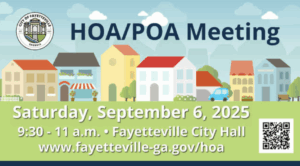Lawsuit expense so far: Under $2 per Fayette citizen; ‘What is your character worth? What are you willing to sell it for? Two bucks?’
A handful of speakers have addressed the district voting issues in the past few months at Fayette County Board of Commissioners meetings, but none like what was heard last week.
The overwhelming majority of citizens using their public comment time at the meeting to address the issue, since the appellate decision was announced to return to a local court for a bench trial, have asked the board to drop the case and leave it as it is. Their reasons have been moral and economic – believing that it is the right thing to do, and not wanting any more county taxpayer money to fund ongoing litigation.
The remarks have usually been brief, as Alice Jones was last week when she said she would rather see money spent on park improvements than the legal case.
“If we are to be of a mindset that is about moving forward, we need to get a grip and accept the judge’s ruling and utilize the funds in a better way as good stewards,” she said. “That would be a legacy to this county that you’ve done the right thing. As a taxpayer I am appealing to you to go back, look back at it realistically and reconsider. Drop the appeal.”
She was followed by Dennis Benson of Peachtree City, who identified himself as an 18-year resident of the area. He is only the second or third public citizen to speak out on the defendants’ side at commission meetings in recent months, but his lengthy prepared remarks were more detailed and passionate than any on either side – invoking the most famous civil rights leader in American history to make his point.
Benson acknowledged that the easiest route would be to pull out of the case because of the expense, but then he immediately said, “I’ve thought about it and I wonder what would have happened if Dr. Martin Luther King Jr. had taken the easy road and he was offered the chance on more than one occasion to do it. I’m not suggesting this lawsuit is anywhere near the struggle that Dr. King went through, but the principle is the same.”
Repeating King’s well-known phrase about judging people by the content of their character rather than the color of their skin, Benson suggested that the plaintiffs in the case are doing exactly the opposite.
“After hearing the case presented by the NAACP attorney at the debate, I was absolutely insulted. My neighbors were insulted, my friends were insulted, and every citizen of Fayette County should have been insulted,” he said. “To come into this county and turn the message of Dr. King on its head by inserting the results of fair and open elections were the result of anything but pure politics by insinuating that the citizens of Fayette County were racists – that is insulting.”
Examining the numbers from recent elections, Benson said the reasoning behind who won and who lost goes beyond superficial charges of racism.
“If you delve below the surface to look at the content of our character in our elections, the content of your message, the persuasiveness of your campaign and the willingness of voters to come out and vote, it’s obvious to the casual observer what happened. If voter turnout is in the teens or twenties, you’re probably going to lose,” he said.
Benson pointed to one recent election where a single white candidate for the Board of Commissioners won by only 184 votes against four black candidates – while more than 7,400 black registered voters did not vote.
“If you can’t get 184 votes because 80 percent of your registered voters didn’t vote, then you’re probably going to lose the election,” he said. “If you have a Ph.D. candidate with a little experience or qualification for the office vs. another Ph.D. candidate with decades of qualifications and experience, the more qualified and experienced candidate is probably going to win.”
Taking it a step further, Benson pointed out what he considered fairly obvious, which is that in an overwhelmingly Republican county like Fayette, a Republican is more likely to win.
“Just ask Herman Cain, who came to Peachtree City and held rallies there, and look at the crowds that came out to witness the content of his character and the power of his message,” he said. “It was a message that we embraced because it was a Republican message and we are Republicans.”
Benson spoke directly to the commissioners, asking them if they participated in any racially-motivated campaigning or were aware of any efforts to keep those 7,400 voters from participating in the electoral process. He added the total legal expense on the case paid out by the commissioners and the school board was equal to about eight one-hundredths of one percent of their combined $237 million annual budgets, or about $1.94 per county resident.
“I have a question for the commissioners,” he said. “What is your character worth? What are you willing to sell it for? Two bucks? If you know that this is false and a smear on the reputation of the good people of Fayette County, then you’ll stand on principle and on the truth.
“The character and integrity of Fayette County is not for sale. We will not allow lawsuits to come into this county and shake us down, but we will defend the integrity and the character of the citizens of Fayette County because it’s the right thing to do and worth every penny spent on it. It’s worth fighting for.”
John E. Jones, who identified himself as the president of the Fayette County chapter of the NAACP, spoke briefly during public comment time. He said when he first moved to the county and identified a lack of diversity in county government, he determined to work to change it.
“We are spending money, making lawyers richer,” he said. “If you want to blame me for that, so be it. But I’m proud of what we’ve accomplished.
“If you want to keep spending money, keep spending money. If you want to keep litigating, keep litigating. But justice will prevail.”
During the commissioners’ regular comment time at the end of the meeting, the only one to address the issue was Steve Brown, who first reminded the audience of the county’s position in the lawsuit.
“You have to remember that the county is listed as the defendant,” he said. “We did not file a lawsuit. We are defending the county in the lawsuit. The decision to initiate litigation was not the county’s.”
Brown pointed out that no one from the plaintiffs’ side ever approached any of the commissioners to talk about the issue at all before filing the lawsuit.
“I was the only one of the Board of Commissioners at the time with a 10-year history with the NAACP as a member in a mixed-race family,” he said. “You would think I was probably the most approachable person in elected office in Fayette County at the time to come see, and no one approached us.”
He added that he has come up with an alternative which people on both sides have said is favorable to “the gerrymandered map that we have now.” He said he would love to explore that possibility if someone would agree to simply talk about it. The commissioners reached out to the plaintiffs at another time in the past but were flatly rejected, he said.
“So when I heard people talk about doing the right thing and making accusations, I’m a little bit stunned,” he noted.
Brown said that one member of the pro-district voting group, whom he did not name, has said more than once that the issue is not about electing more blacks but rather electing more Democrats. “It’s been printed in the newspaper,” he said.
Reiterating his desire to see the issue resolved, Brown concluded his remarks by saying, “It would be great if we could go to Judge Batten and say, ‘Hey, we fixed it. No need to go to trial.’ We can do that. But we have to be able to talk about it.”










Leave a Comment
You must be logged in to post a comment.